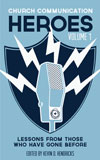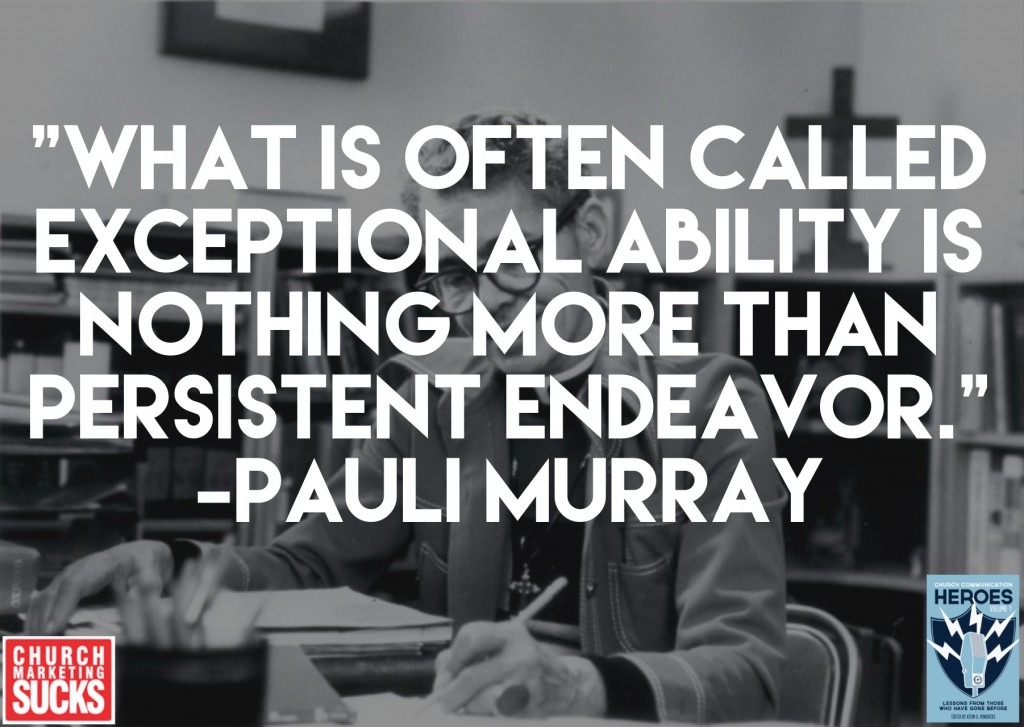This Friday, Nov. 1—All Saints’ Day—we’ll release our latest ebook, Church Communication Heroes Volume 1: Lessons From Those Who Have Gone Before. Here’s an excerpt from that new book, a chapter on one of my favorite heroes: activist, poet, lawyer and priest Pauli Murray.
“What is often called exceptional ability is nothing more than persistent endeavor.” -Pauli Murray (1910-1985)
A writer, teacher, lawyer and priest, Pauli Murray refused to be categorized.
In response to the condescending, “You’re a credit to your race,” she’d quip, “Be a credit to your space.”
Both of Pauli’s parents died when she was young, so she was raised by her Aunt Pauline, who served more than 60 years as a teacher in poor, segregated schools in North Carolina. Her great-grandparents were both slaves and slave owners. Her grandfather joined the Union in the Civil War as a free black soldier, then went south to teach former slaves. Pauli’s grandmother was baptized in a church that forced her to sit in a balcony reserved for slaves.
Born in the segregated South, Pauli Murray understood oppression and injustice from the beginning. She also fought back at an early age: “[As a child,] I carried my own private protest. I walked almost everywhere to stay off the Jim Crow streetcars and I would not go downtown to the theaters because that meant climbing the back stairs to the colored ‘peanut gallery’.”
A woman ahead of her time, Pauli’s childhood protests were a taste of what was to come:
- Fifteen years before Rosa Parks, Pauli Murray refused to give up her seat on a segregated bus and was jailed.
- Nearly 20 years before the lunch counter protests spread across the South, Pauli Murray led what’s considered the first restaurant sit-ins, which were ultimately successful.
- Years before the Supreme Court ruled that segregated schools were unconstitutional in Brown vs. Board of Education, Pauli Murray urged civil rights lawyers to stop arguing the inequality of “separate but equal” facilities and argue against segregation itself. The NAACP used her strategy and Thurgood Marshall called her work the “bible” of the movement.
- Pauli Murray’s application to graduate school at the University of North Carolina in 1938 was rejected because she was black. Her application to Harvard Law School in 1944 was rejected because she was a women (despite a letter from President Roosevelt on her behalf). Today Harvard houses a collection of her letters.
- The fact that the Episcopal Church didn’t allow women to be ordained didn’t stop Pauli Murray from starting seminary in 1973 on her path to ordination. In 1977 she became the first black woman to be ordained as a priest in the Episcopal Church.
Pauli Murray’s entire life was a crusade for human equality. Here are four simple lessons from her tremendous life:
It’s Never Too Late
Pauli entered seminary at the age of 62 and became a priest at 66. It’s never too late to start something, whether it’s the education you always wanted or a new career you’ve always imagined.
Speak Justice to Power
Pauli established a friendship with first lady Eleanor Roosevelt, and would frequently test this friendship by speaking out against injustice. Always speak love and justice into power and prestige. Never be intimidated into polite silence.
Ideas, Words & Action
As a lawyer, poet and activist, Murray’s trademarks were compelling ideas, stirring words and brave action. Effective communication needs all three. Ideas for their power and energy, words to compel us and spread the momentum, and action to bring it to life.
Shift Gears
She was a writer, lawyer, teacher and priest, constantly reinventing herself. But rather than a wayward, wandering soul, Pauli Murray’s shifting always had intentionality. Don’t be defined by nor limited to your role or title. It all comes together, as Pauli discovered:
“All the strands of my life had come together. Descendant of slave and of slave owner, I had already been called poet, lawyer, teacher and friend. Now I was empowered to minister the sacrament of One in whom there is no north or south, black or white, no male or female—only the spirit of love and reconciliation drawing us toward the goal of human wholeness.”
 More:
More:
- Buy a copy of Church Communication Heroes Volume 1.
- You can learn more about Pauli Murray from her books, Pauli Murray: The Autobiography of a Black Activist, Feminist, Lawyer, Priest and Poet, Proud Shoes: The Story of An American Family and Pauli Murray: Selected Sermons and Writings.
- Check out other heroes in our Church Communication Heroes series.





